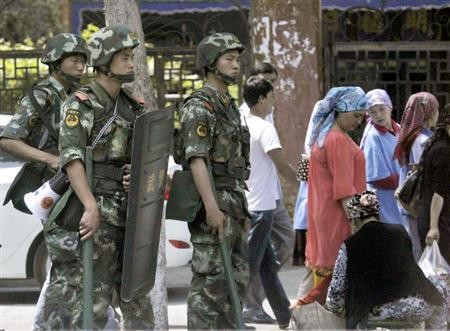Law enforcement officials from northwest China’s Xinjiang Uyghur Autonomous Region have cracked down on 181 terror groups, following a sweeping anti-terrorism campaign in 2014, the local government announced on Monday.
The regional committee also pointed out that Xinjiang's ethnic groups were crucial in the campaign, as the police have solved 81 terror cases based on information provided by the public.
The campaign was launched a day after the bombing of a market in the region's capital of Urumqi that led to 39 deaths on May 22, 2014.
Aside from anti-terror activities, law enforcement officials have also clamped down on religious extremism, media promoting terrorism, and illegal border crossings.
Xinjiang prosecutors and courts defended procedures used during investigations and trials, saying that defendants' legal rights were upheld. For a few cases whose evidence proved insufficient, prosecutors returned the cases to the police for further investigation, Xinhua reported.
The campaign has also elicited guarded optimism from local observers, who suggested distinguishing terrorism from religious and ethical customs to avoid indiscriminate crackdown on potential extremist activities and to prevent the penetration of extremism.
"The local government has indeed taken great efforts to purge terror groups from the region," said Pan Zhiping, the director of the Research Institute of Central Asia at the Xinjiang Academy of Social Sciences. "However, it is far from a turning point in the long-term maintenance of social stability as other groups will emerge."
Turgunjan Tursun, a research fellow at the Xinjiang Academy of Social Sciences, said that stopping the spread of terrorism and extremism in China requires long-term efforts, such as uniting Xinjiang's ethnic minority groups by settling conflicts and implementing the "principle of five keys to governing Xinjiang."
The principle, which was proposed by the CPC regional committee in Nov. 2014, stated that ideological, cultural, folk custom, and religious issues should be solved with respect to and in accordance with the inherent laws of ideology, culture, customs, and religion, while combating terrorism should be done within the rule of law.
Pan also suggested the prioritizing of the education of farmers who live in remote villages, which could serve as terrorist hideouts.
He praised the drawing and sketch comedy activities depicting the threat of terrorism, saying such activities are simple yet effective in making farmers understand the threat that terrorism poses.
Since August, the Xinjiang government has been conducting cultural activities, including short sketch comedies and drawing contents, to help educate the Uyghur people about extremism and separatism.




























